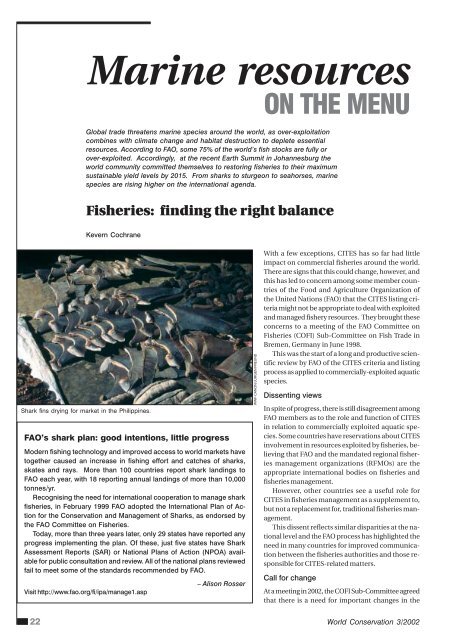CITES in the new millennium - IUCN
CITES in the new millennium - IUCN
CITES in the new millennium - IUCN
You also want an ePaper? Increase the reach of your titles
YUMPU automatically turns print PDFs into web optimized ePapers that Google loves.
Mar<strong>in</strong>e resources<br />
ON THE MENU<br />
Global trade threatens mar<strong>in</strong>e species around <strong>the</strong> world, as over-exploitation<br />
comb<strong>in</strong>es with climate change and habitat destruction to deplete essential<br />
resources. Accord<strong>in</strong>g to FAO, some 75% of <strong>the</strong> world’s fish stocks are fully or<br />
over-exploited. Accord<strong>in</strong>gly, at <strong>the</strong> recent Earth Summit <strong>in</strong> Johannesburg <strong>the</strong><br />
world community committed <strong>the</strong>mselves to restor<strong>in</strong>g fisheries to <strong>the</strong>ir maximum<br />
susta<strong>in</strong>able yield levels by 2015. From sharks to sturgeon to seahorses, mar<strong>in</strong>e<br />
species are ris<strong>in</strong>g higher on <strong>the</strong> <strong>in</strong>ternational agenda.<br />
Fisheries: f<strong>in</strong>d<strong>in</strong>g <strong>the</strong> right balance<br />
Kevern Cochrane<br />
Shark f<strong>in</strong>s dry<strong>in</strong>g for market <strong>in</strong> <strong>the</strong> Philipp<strong>in</strong>es.<br />
FAO’s shark plan: good <strong>in</strong>tentions, little progress<br />
Modern fish<strong>in</strong>g technology and improved access to world markets have<br />
toge<strong>the</strong>r caused an <strong>in</strong>crease <strong>in</strong> fish<strong>in</strong>g effort and catches of sharks,<br />
skates and rays. More than 100 countries report shark land<strong>in</strong>gs to<br />
FAO each year, with 18 report<strong>in</strong>g annual land<strong>in</strong>gs of more than 10,000<br />
tonnes/yr.<br />
Recognis<strong>in</strong>g <strong>the</strong> need for <strong>in</strong>ternational cooperation to manage shark<br />
fisheries, <strong>in</strong> February 1999 FAO adopted <strong>the</strong> International Plan of Action<br />
for <strong>the</strong> Conservation and Management of Sharks, as endorsed by<br />
<strong>the</strong> FAO Committee on Fisheries.<br />
Today, more than three years later, only 29 states have reported any<br />
progress implement<strong>in</strong>g <strong>the</strong> plan. Of <strong>the</strong>se, just five states have Shark<br />
Assessment Reports (SAR) or National Plans of Action (NPOA) available<br />
for public consultation and review. All of <strong>the</strong> national plans reviewed<br />
fail to meet some of <strong>the</strong> standards recommended by FAO.<br />
Visit http://www.fao.org/fi/ipa/manage1.asp<br />
– Alison Rosser<br />
With a few exceptions, <strong>CITES</strong> has so far had little<br />
impact on commercial fisheries around <strong>the</strong> world.<br />
There are signs that this could change, however, and<br />
this has led to concern among some member countries<br />
of <strong>the</strong> Food and Agriculture Organization of<br />
<strong>the</strong> United Nations (FAO) that <strong>the</strong> <strong>CITES</strong> list<strong>in</strong>g criteria<br />
might not be appropriate to deal with exploited<br />
and managed fishery resources. They brought <strong>the</strong>se<br />
concerns to a meet<strong>in</strong>g of <strong>the</strong> FAO Committee on<br />
Fisheries (COFI) Sub-Committee on Fish Trade <strong>in</strong><br />
Bremen, Germany <strong>in</strong> June 1998.<br />
This was <strong>the</strong> start of a long and productive scientific<br />
review by FAO of <strong>the</strong> <strong>CITES</strong> criteria and list<strong>in</strong>g<br />
process as applied to commercially-exploited aquatic<br />
species.<br />
Dissent<strong>in</strong>g views<br />
In spite of progress, <strong>the</strong>re is still disagreement among<br />
FAO members as to <strong>the</strong> role and function of <strong>CITES</strong><br />
<strong>in</strong> relation to commercially exploited aquatic species.<br />
Some countries have reservations about <strong>CITES</strong><br />
<strong>in</strong>volvement <strong>in</strong> resources exploited by fisheries, believ<strong>in</strong>g<br />
that FAO and <strong>the</strong> mandated regional fisheries<br />
management organizations (RFMOs) are <strong>the</strong><br />
appropriate <strong>in</strong>ternational bodies on fisheries and<br />
fisheries management.<br />
However, o<strong>the</strong>r countries see a useful role for<br />
<strong>CITES</strong> <strong>in</strong> fisheries management as a supplement to,<br />
but not a replacement for, traditional fisheries management.<br />
This dissent reflects similar disparities at <strong>the</strong> national<br />
level and <strong>the</strong> FAO process has highlighted <strong>the</strong><br />
need <strong>in</strong> many countries for improved communication<br />
between <strong>the</strong> fisheries authorities and those responsible<br />
for <strong>CITES</strong>-related matters.<br />
Call for change<br />
At a meet<strong>in</strong>g <strong>in</strong> 2002, <strong>the</strong> COFI Sub-Committee agreed<br />
that <strong>the</strong>re is a need for important changes <strong>in</strong> <strong>the</strong><br />
22 World Conservation 3/2002<br />
WWF-CANON/JURGEN FREUND

















